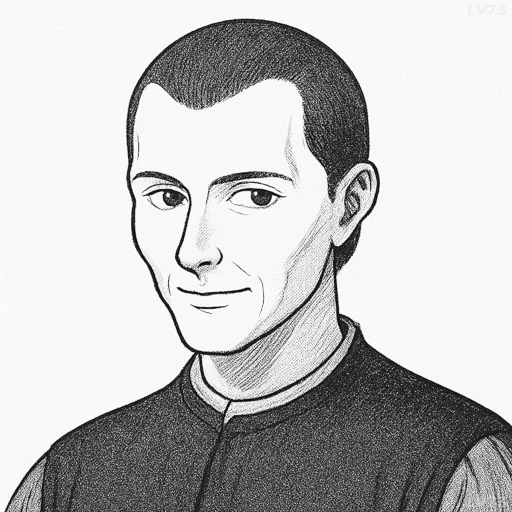“A return to first principles in a republic is sometimes caused by the simple virtues of one man. His good example has such an influence that the good men strive to imitate him, and the wicked are ashamed to lead a life so contrary to his example.”

- May 3, 1469 – June 21, 1527
- Born in the Republic of Florence (Italy)
- Political thinker and diplomat
table of contents
Quote
“A return to first principles in a republic is sometimes caused by the simple virtues of one man. His good example has such an influence that the good men strive to imitate him, and the wicked are ashamed to lead a life so contrary to his example.”
Explanation
In this quote, Niccolò Machiavelli reflects on the power of individual virtue and moral leadership in revitalizing a republic or state. He suggests that even in times of decay or corruption, the example of one virtuous individual can inspire others to follow suit, leading to a renewal of societal values and a return to fundamental principles. Machiavelli believed that while laws and institutions were essential, the character of a ruler or influential figure could have a profound impact on shaping public behavior. A single virtuous leader could set an example so powerful that it influenced both the good to strive for higher standards and the wicked to feel ashamed of their immoral actions.
This idea comes from the political realities of Renaissance Italy, where virtue in leaders was often seen as a key factor in restoring order and ensuring the prosperity of a state. Machiavelli saw the ideal leader as someone who could embody virtuous qualities (such as courage, integrity, and wisdom), inspiring those around him to act in the best interest of the state. This was particularly important in republics, where citizen participation was necessary, and moral decline could lead to political instability. For instance, Cicero, in ancient Rome, was often cited as a model of virtue who sought to restore the republic’s ideals during times of political crisis.
In modern contexts, this quote can be applied to leadership and social change. Political figures who demonstrate integrity and a commitment to public service can inspire citizens to participate more actively in civic life and foster a culture of accountability. For example, the civil rights leadership of Martin Luther King Jr., whose moral courage and commitment to justice inspired millions, had a lasting influence on American society, encouraging others to emulate his virtues. Similarly, in the world of business, CEOs who prioritize ethical practices can set a standard for corporate responsibility, encouraging others in the industry to follow their example. Machiavelli’s point remains that personal example can be a powerful tool in restoring values and rejuvenating both political systems and communities.
Would you like to share your impressions or related stories about this quote in the comments section?


